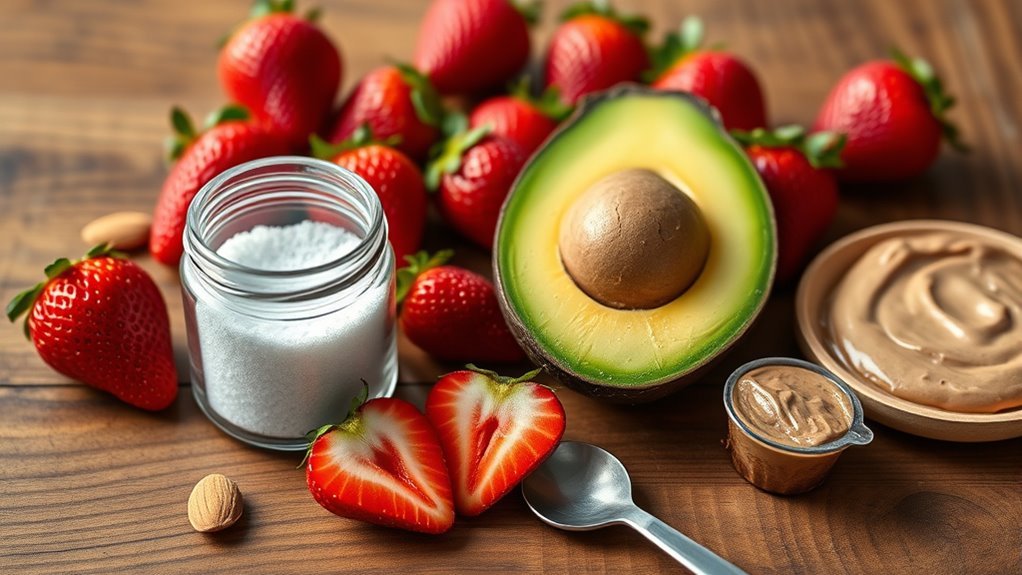On a ketogenic diet, you can usually consume about 20 to 50 grams of sugar a day, but it’s important to distinguish between natural and added sugars. Natural sugars from fruits and dairy can fit into your intake, while added sugars should be minimized to maintain ketosis. Always check labels for hidden sugars in processed foods. To learn more about managing sugar cravings and making the most of your keto journey, explore additional tips and strategies.
Understanding Ketosis and Sugar

When you begin a ketogenic diet, it’s important to understand how sugar impacts your body and ketosis. Sugar plays a significant role in sugar metabolism, which can influence your ability to reach and maintain ketosis. When you consume sugar, your body tends to prioritize it as an energy source, hindering the fat-burning process that ketosis promotes. This shift can diminish the ketosis benefits, such as increased energy, enhanced mental clarity, and improved weight management. To experience these advantages, you’ll want to minimize sugar intake and focus on healthy fats and proteins. By doing so, you can encourage your body to efficiently shift into ketosis, allowing you to enjoy the freedom and energy that comes from fat as your primary fuel source.
Types of Sugars: Natural vs. Added

When considering sugar on a keto diet, it’s important to distinguish between natural and added sugars. Natural sugars, found in fruits and dairy, come with essential nutrients, while added sugars can contribute to health issues and derail your keto goals. You’ll also want to explore sugar alternatives that can satisfy your sweet tooth without impacting your carb intake.
Natural Sugar Sources
Many people wonder about the role of natural sugars in a ketogenic diet. While keto emphasizes low carbohydrate intake, understanding your options can help you maintain balance. Fruit choices, like berries, are lower in sugar and can fit into your macros if consumed in moderation. They also offer vitamins and antioxidants beneficial for overall health.
Natural sweeteners, such as stevia or erythritol, provide sweetness without spiking your blood sugar. These options can satisfy your cravings while keeping carb counts low. Remember, moderation is key; even natural sugars can add up. By selecting the right fruits and sweeteners, you can enjoy a delicious variety of flavors while staying true to your keto lifestyle. Embrace your freedom to choose wisely!
Added Sugar Concerns
While natural sugars from fruits and sweeteners can fit into a ketogenic diet, added sugars present a different challenge. Added sugar is often found in processed foods and can lead to numerous health risks, including weight gain and increased cravings. This can trigger sugar addiction, making it harder to stick to your keto goals. Unlike natural sugars, which come with fiber and nutrients, added sugars offer empty calories that can derail your efforts. It’s essential to scrutinize ingredient labels and minimize your intake of added sugars. By staying informed and making conscious choices, you can enjoy the freedom of a keto lifestyle without the pitfalls associated with added sugars. Empower yourself with knowledge to make better choices for your health.
Sugar Alternatives Overview
Understanding the differences between natural and added sugars is essential for anyone following a ketogenic diet. Natural sugars occur in fruits, vegetables, and dairy, while added sugars are introduced during processing. When considering sugar substitutes, it’s vital to choose wisely.
- Stevia: A plant-based sweetener with zero calories.
- Erythritol: A sugar alcohol that’s low in calories and doesn’t spike blood sugar.
- Monk Fruit: Natural and calorie-free, making it a popular choice.
- Xylitol: Another sugar alcohol, though it should be used in moderation.
- Allulose: A rare sugar with minimal impact on blood glucose levels.
This sugar substitutes overview will help you find keto-friendly sweeteners that align with your lifestyle, giving you freedom while maintaining your diet goals.
Daily Sugar Limits on Keto

When you’re following a ketogenic diet, it’s crucial to be mindful of your sugar intake to maintain ketosis. The general keto guidelines suggest limiting your total carbohydrate intake to about 20-50 grams per day, with sugars being a significant part of that. Ideally, you’ll want to aim for sugar moderation, keeping your added sugars as low as possible. Natural sugars from fruits and dairy can still fit into your daily limit, but be cautious with quantities. Some individuals can tolerate a bit more sugar without affecting ketosis, while others may need stricter limits. Listen to your body and adjust accordingly to find your personal balance, ensuring you enjoy the freedom of the keto lifestyle without sacrificing your goals.
Hidden Sugars in Foods
Many people don’t realize that hidden sugars lurk in a variety of everyday foods, making it challenging to stay within your keto limits. Sugar detection isn’t just about counting grams; it’s about recognizing hidden ingredients that can sneak into your meals. Here are some common culprits:
- Sauces and dressings
- Processed meats
- Flavored dairy products
- Snack bars
- Canned vegetables
These items can contain significant amounts of sugar, even if they don’t taste sweet. Always read labels carefully to verify you’re not exceeding your daily sugar limits. Staying informed helps you maintain your keto lifestyle while enjoying the freedom to choose your meals wisely. Remember, awareness is key to avoiding those sneaky sugars!
Sugar Alcohols and Their Impact
When you’re following a keto diet, understanding sugar alcohols is essential, as they can impact your carb intake. Common sugar alcohols like erythritol and xylitol can be lower in calories and carbs, but calculating their net carbs is vital for staying within your limits. Keep in mind that while they might be a better alternative to sugar, they can still affect your body differently.
Common Sugar Alcohols
Sugar alcohols are a popular alternative sweetener for those following a ketogenic diet, offering sweetness without the significant carb load of regular sugar. Here’s a quick rundown of some common sugar alcohols:
- Erythritol: Low in calories, it has erythritol benefits like minimal impact on blood sugar.
- Xylitol: Though it has a lower glycemic index, it can cause digestive issues in some.
- Maltitol: While it tastes sweet, maltitol drawbacks include a higher carb count and potential digestive discomfort.
- Sorbitol: Often used in sugar-free products, it can also lead to bloating.
- Isomalt: A good option for baking, but it may also cause gastrointestinal distress.
Using sugar alcohols mindfully can help you satisfy your sweet tooth while sticking to your keto goals.
Net Carbs Calculation
Understanding how to calculate net carbs is vital for effectively managing your ketogenic diet, especially since sugar alcohols can considerably influence your carb count. Net carbs are determined by subtracting fiber and certain sugar alcohols from the total carbohydrates. While some sugar alcohols, like erythritol, have negligible effects on blood sugar and can often be fully deducted, others like maltitol can impact your net carbs more noticeably. It’s important to read labels and assess the sugar sources in your foods. By being mindful of how sugar alcohols fit into your total carb allowance, you can enjoy a wider variety of foods while maintaining your keto lifestyle. Balancing indulgence and health is key to achieving your dietary goals.
Reading Nutrition Labels Effectively
Although managing nutrition labels might seem intimidating, doing so is essential for anyone on a keto diet. Understanding nutrition label basics can empower you to make informed choices and keep your carb intake in check. Here are some key points to focus on:
Managing nutrition labels is crucial for a successful keto diet, helping you make informed choices and monitor carb intake effectively.
- Always check the serving size awareness to determine how many servings you’re consuming.
- Look for total carbohydrates and subtract fiber and sugar alcohols to get net carbs.
- Pay attention to added sugars, which can sneak into many products.
- Evaluate protein content; it can impact ketosis.
- Don’t overlook other ingredients; some may not align with your keto goals.
Alternatives to Sugar on Keto
When you’re on a keto diet, finding suitable alternatives to sugar is crucial for maintaining your low-carb lifestyle. Luckily, there are several sugar substitutes and keto friendly sweeteners that can satisfy your sweet tooth without derailing your progress. Stevia, erythritol, and monk fruit are popular choices, as they contain little to no carbohydrates and won’t spike your insulin levels. Each of these options has its own unique taste profile, so experimenting to find what you enjoy most is key. Additionally, verify to check labels, as some sweeteners may contain hidden sugars. By incorporating these alternatives, you can keep your meals enjoyable while staying true to your keto journey, allowing you the freedom to indulge without guilt.
Tips for Managing Sugar Cravings
Even with the right sugar substitutes at your disposal, sugar cravings can still pose a challenge while you’re on keto. Here are some effective tips for sugar cravings management that can help you stay on track:
- Stay hydrated; sometimes, thirst masquerades as hunger.
- Incorporate healthy fats to keep you satisfied longer.
- Practice mindful eating to recognize emotional eating triggers.
- Keep keto-friendly snacks on hand to curb cravings.
- Distract yourself with activities like walking or reading.
Frequently Asked Questions about Sugar on Keto
1. How much sugar can I have on a keto diet?
On a keto diet, it’s generally recommended to limit your sugar intake to less than 20-50 grams of total carbohydrates per day, which includes all forms of sugar. Ideally, you should aim for close to zero added sugars, as they can disrupt ketosis. Focus on natural sources of carbohydrates, such as leafy greens and non-starchy vegetables, which have minimal sugar content.
2. Can I have sugar substitutes on a keto diet?
Yes, many people on a keto diet use sugar substitutes like stevia, erythritol, and monk fruit sweetener, as they have little to no impact on blood sugar levels. However, it’s important to monitor your body’s response to these sweeteners, as some can cause digestive issues when consumed in large quantities. Always check labels to ensure they are keto-friendly.
3. What types of foods should I avoid to keep my sugar intake low on keto?
To keep your sugar intake low on a keto diet, avoid sugary foods such as candy, desserts, sweetened beverages, and most fruits. Additionally, limit processed foods that may contain hidden sugars, such as sauces, dressings, and even some dairy products. Instead, focus on whole, unprocessed foods that are low in carbohydrates.
4. What happens if I eat too much sugar on keto?
If you consume too much sugar while on a keto diet, your body may exit ketosis, the metabolic state where fat is used for energy instead of carbohydrates. This can lead to increased cravings, weight gain, and a halt in progress toward your health and fitness goals. If you find yourself slipping, it may be helpful to track your carbohydrate intake more closely.
5. Are there any health benefits to avoiding sugar on keto?
Yes, avoiding sugar on a keto diet can lead to numerous health benefits, including improved blood sugar control, weight loss, and reduced cravings. Cutting out sugar can also help decrease the risk of developing insulin resistance and other metabolic disorders. Many people report increased energy levels and better mental clarity when they limit their sugar intake.
References
- https://www.healthline.com/nutrition/how-much-sugar-on-keto
- https://www.ncbi.nlm.nih.gov/pmc/articles/PMC7023363/
- https://www.webmd.com/diet/obesity/ss/slideshow-keto-diet
- https://www.diabetes.org/nutrition/understanding-foods/sugar
- https://www.mayoclinic.org/healthy-lifestyle/nutrition-and-healthy-eating/in-depth/keto-diet/art-20460434
- https://www.cdc.gov/nutrition/data-statistics/know-your-limit-for-added-sugars.html


